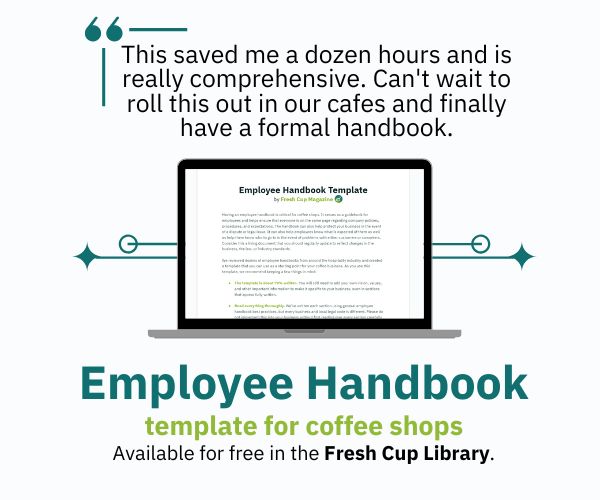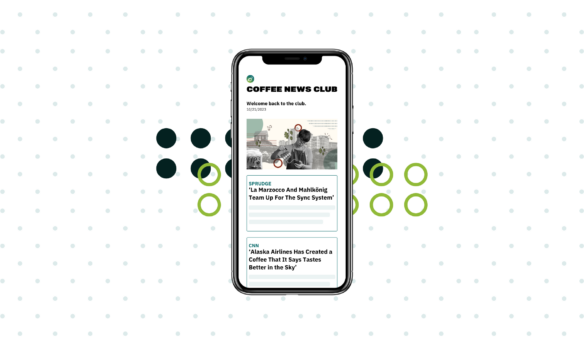The British are coming (to drink your coffee)! Plus, the effects of migration on the coffee supply chain, Starbucks and union workers face off in court, and Blue Bottle is using carbon offsets to achieve carbon neutrality by 2024.
‘How Harvest Migration is Impacting the Coffee Supply Chain’ – via Global Coffee Report
The article contains startling insights into the problems and potential solutions surrounding coffee-linked migration.
Global Coffee Report (GCR) analyzed the impact of coffee on migration: why do people flee coffee-producing countries, and what happens when they leave? “According to the Migration Policy Institute, in 2022 there was a record-breaking 2.4 million migrant apprehensions at the United States-Mexico border, with 43 per cent coming from Guatemala, Honduras and El Salvador where coffee is a prominent export,” the GCR article states.
It seems that coffee prices may impact migration. For example, GCR found that a drop in the commodity coffee C price from $1.60 to $1.40 would mean an estimated 120% increase in migration from coffee-producing regions in Honduras. A 5% fall in coffee prices would result in more than 14,000 more Honduran residents migrating.
It’s not just Honduras: migration from Central and South America has increased massively over the past few years, especially after the most recent coffee price crisis.
Rising migration patterns also affect labor needs on farms. “During this season’s harvest, Central America reported mass labor shortages, higher costs, and fleeing youth from coffee communities,” said Lauren Jones of the University of California, Berkeley. “Some cooperatives have seen 10 to 15 community members disappear in a matter of weeks, all of whom were former coffee pickers.”
Jones clarifies that the reasons for migrating are complex: many flee their homes to avoid violence and political tumult, among other concerns. “While we may see short-term impacts on labor during harvest season, the drivers and resulting implications of migration on coffee are interconnected with climate change, food insecurity, low wages, and insufficient income. In addition, it is one of the main causes of next generation farmers leaving their communities.”
While it might be easy to blame increased migration on coffee prices, several people interviewed for the article cautioned that it is more complex than that. “Receiving a good price for coffee without structure does not mean it will change the situation,” said International Women’s Coffee Alliance Chapter Relations Manager Blanca María Castro. “There needs to be a plan and structure where farmers can ensure not only their kids, but their grandkids, can follow the farming profession and take care of the land.”
This is an opinion echoed by Brazil Specialty Coffee Association Executive Director Vinicius Estrela. “Unless we can ensure that people can proudly say they are coffee producers in their regions, that it’s not just an economically viable activity, but rewarding, something their children want to carry on, we face a future in which coffee is overwhelmingly dominated by a few big players offering less diverse, less interesting coffees at higher prices,” Estrela said.
‘Starbucks and Union Face Off in Seattle Over Negotiation Rules’ – via KUOW.org
A hearing in Seattle could shake things up in the ongoing battle between Starbucks and its organizing workers.
The National Labor Relations Board and Starbucks Workers United are going to court to request a federal order to force Starbucks to negotiate; the company says it’s always been willing to negotiate and accuses the union of stalling.
The hearing will cover two main issues:
First, Starbucks wants all negotiations to take place in-person, while the union prefers a hybrid approach to allow organizers to join via Zoom.
Second, the union wants to ratify one nationwide contract covering all unionized stores and then allow individual stores to negotiate more specific concerns; Starbucks says that was its original plan, but it agreed to store-by-store negotiations at the union’s request. Both sides blame the other, and now a federal administrative judge will decide who is right.
“It shouldn’t take a year and a half to get to the table just because they don’t like the way that we’ve all decided that we want to bargain with the company,” Starbucks worker and organizer Elizabeth Duran said outside the hearing.
In May 2023, Workers United president Lynne Fox called for a nationwide contract, telling HuffPost that Starbucks’ refusal was a delay tactic. “I can only speculate [as to Starbucks’ motives], but my guess is to purposely complicate the process and elongate the process,” Fox said. A Starbucks spokesperson told HuffPost that Fox’s demand was “a deliberate attempt to distract from Workers United’s failure or inability to bargain for nearly 300 single stores, as they successfully litigated and enforced on Starbucks.”
A decision in these hearings could take weeks or months, but at the very least, workers hope the case can be an example for workers asserting their right to unionize and bargain in good faith. “My biggest hope is that we set new precedent,” a barista named Duran said, “so that no other worker has to go through a year and a half of waiting to get to a single bargaining table to discuss a single line on a single proposal, the way that we have.”
‘Coffee Overtakes Tea for First Time in UK Consumer Survey’ – via STiR Coffee and Tea
The United Kingdom is a nation of tea lovers, but coffee seems to be pulling ahead.
Statista Consumer Insights polled 24,000 UK residents about a wide range of personal preferences and found that 63% of respondents drink coffee while only 59% drink tea regularly. In the US, we’re already used to the idea that coffee reigns supreme—according to the National Coffee Association, just 37% of Americans drink tea daily compared to 64% who drink coffee.
But it’s not quite the same across the pond, where a taste for tea has dominated palates for centuries. Tea is embedded into British culture, and the country’s historical thirst for the beverage had—and still has—a significant impact on its former colonial subjects. In India, 79% of adults prefer tea compared to just 19% who drink coffee, while most people in Kenya prefer tea, even though coffee consumption is increasing.
The British might be drinking more coffee, but they’re not necessarily drinking specialty coffee: instant is still popular, bought by 80% of UK households, while single-pod brewers “are growing the fastest among all segments.”
More News
‘Starbucks opens Coffee Innovation Park in China’ – via Global Coffee Report
‘Vietnam’s Most Popular Coffee Shop Opens First U.S. Location in Southern California‘ – via Eater LA
‘The Inaugural DC Coffee Festival Is Happening At The End Of September‘ – via Sprudge
‘Coffee Consumer Trends: Inside the NCA’s Fall 2023 Report‘ – via Daily Coffee News
‘Starbucks Ordered to Court Over Allegations Refresher Drinks Lack Fruit‘ – via USA Today
‘The Cafe Business Expo Brings Coffee Professionals to London In October’ – via Fresh Cup Magazine
‘SCA Broadcasting 2023 Coffee Retail Summit in October‘ – via Daily Coffee News
‘Announcing The Sprudge Design Awards, Honoring Outstanding Coffee Design‘ – via Sprudge
The Week in Coffee Unionizing
Workers at a Brooklyn, New York coffee shop and bar who filed for unionization in November 2022 have won their first contract. The contract for employees of the Daily Press includes a health savings fund and protections against sexual harassment and discrimination.
Since the filing, organizers have been negotiating a contract to move toward a cooperative ownership model. Workers already take an active part in operating the business, collectively deciding schedules, wages and time off. “Our contract is unique,” bartender Gabriel Caldwell told Patch.com. “We all meet once a month, and per that contract, we make all operational decisions collectively. The goal is to move towards cooperative ownership.”
Workers began organizing with Workers United when the previous owner cut opening times, which led to employees losing hours and the threat of layoffs. Former bartender and organizer Joshua Thies bought the business soon after and immediately recognized the union. “Since the successful unionization, I noticed a significant change in the team.” Thies said. “Folks have a voice, autonomy, and the ability to make positive change. They took on a lot of responsibility.”
The Week in Corporate Coffeewashing
Blue Bottle Coffee announced its “high-level roadmap” to carbon neutrality by 2024. The roadmap includes a goal to reduce its greenhouse gas emission (GHG) intensity—or “carbon footprint per kilogram of product sold”—by 20%.
The company, owned by Nestlé, first committed to a carbon-neutral goal in 2021 and conducted a third-party life cycle assessment of its baseline GHG emissions in 2022. From there, Blue Bottle put together a plan based on three areas where its emissions are highest: green coffee sourcing, cafe operations, and overheads. The company pointed to its decision to offer oat milk as the default milk choice in its US cafes as an example of emissions reductions it is making in cafes—alternative milks have a far lower carbon footprint than dairy.
“Embracing sustainability isn’t just a choice; it’s imperative that Blue Bottle is part of the solution if we are to ensure the legacy of a delicious cup of coffee for generations to come,” said CEO Karl Strovink in an announcement. “Our commitment to reimagining how we do business is a reflection of our dedication to the environment, our guests, and the rich experience of savoring every sip.”
But reducing carbon emissions by 20%, as stated in the roadmap, doesn’t equal carbon neutrality. That’s where carbon offsets come in. “For unabated emissions, Blue Bottle will purchase high-quality carbon credits, including nature-based climate solutions,” the announcement said. The company already uses carbon offsets to mitigate its e-commerce shipping emissions.
At one point considered an effective way for businesses and individuals to compensate for their emissions, the effectiveness of carbon offsets has come into question in recent years. An article from The Guardian reported that “more than 90% of rainforest carbon offsets by biggest certifier are worthless,” and Greenpeace called carbon offsets “a scam.”
Beyond the Headlines
‘Three Questions with Cydni Patterson of Sweet Finish’ by Jen Roberts
‘David Lynch, “Mulholland Drive” And The Meaning Of Specialty Coffee’ by Jackson O’Brien
‘Cold Brew Opens Up New Food Safety Concerns’ by Jordan Montgomery















